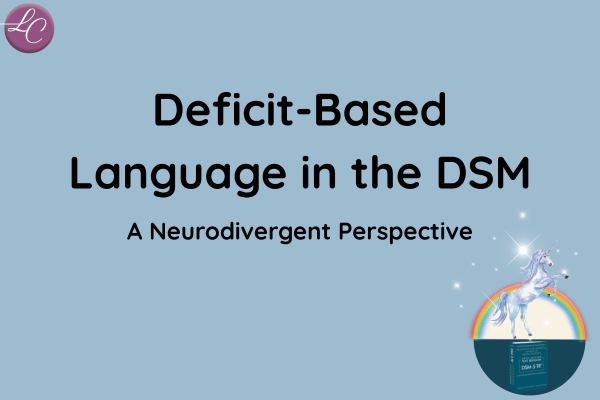Deficit-Based Language in the DSM: A Neurodivergent Perspective
Have you ever read your own diagnostic report and felt it was more of a critique than a reflection of who you are?
Many adults describe the experience as confronting — even painful.
The DSM (Diagnostic and Statistical Manual) is considered the “gold standard” in diagnosis for autism, ADHD, and other neurodivergences.
Yet the way it describes us is overwhelmingly deficit-based.
What the DSM Gets Wrong
Phrases like:
- Deficits in executive functioning.
- Restricted, repetitive patterns of behaviour.
- Persistent deficits in social communication.
Each one suggests a shortcoming, a failure, a lack. But this is not how neurodivergent people actually live and experience life.
When Diagnosis Hurts
For many of us, diagnosis comes with mixed emotions.
There’s relief in understanding why we feel different.
But alongside it comes the heavy message: “Here’s everything you’re not good at.”
It shapes how others see us.
And, more dangerously, it can start to shape how we see ourselves.
Why Understanding Matters
Misreading shutdown as daydreaming (or vice versa) can lead to frustration, shame, or unnecessary pressure. Many neurodivergent adults grew up hearing:
- Stop being lazy.
- Pay attention.
- You’re off in your own world again.
This creates a cycle of self-doubt and hypervigilance.
By learning to recognise and respond with empathy, we offer something better — validation and safety, which fosters recovery and re-engagement.
What the DSM Misses Entirely
No diagnostic manual captures the full reality of neurodivergence, the –
- Flow state of immersing in a deep interest
- Clarity and honesty that bypasses superficial small talk
- Empathy, loyalty, and creativity that enrich relationships and work
- Sensory joy of noticing subtle patterns others overlook
None of this is a deficit. This is humanity.
Why Reframing Matters
The harm of deficit-based language is that it boxes us into limitation.
Reframing allows us to see the truth: we are not broken.
Yes, challenges are real.
But alongside them exist strengths, gifts, and perspectives that the DSM was never designed to capture.
Watch the Video
Watch this for more information and inspiration.
Final Thoughts
Recognising whether it’s daydreaming or shutdown isn’t just about managing behaviour.
It’s about honouring experience — your child’s and your own.
When we meet these moments with empathy, we shift from frustration to understanding, from correction to connection.
Every time we pause and see what’s really happening beneath the surface, we’re breaking old patterns and building safer spaces for neurodivergent minds to thrive.
Closing Reflection
A diagnosis can provide clarity and community — but it should never be the whole story.
As neurodivergent adults, part of our healing is learning to reclaim the narrative. To see ourselves not through the lens of deficits, but through the richness of lived experience.
🌿 If you’re ready to explore ways of reconnecting with your inner self — through coaching, sound healing, or simply conversation — I’d love to walk alongside you.
Read more about my services here or book a (free) chat here.

